Darwin's House of Cards
Tom Bethell, 2017
Tom Bethell (born July 17, 1936) is a journalist who writes mainly on economic and scientific issues. Born and raised in London. He is a senior editor of The American Spectator and was for 25 years a media fellow of the Hoover Institution. He was formerly Washington editor of Harper's, and an editor of the Washington Monthly. Has written a number of articles for Evolution News and Views.
Introduction
p9 Describes his experience at Oxford in 1960 near 100th anniversary of Orign
p9 Relates fact that even in 1960 he was bothered by the phrase in the subtitle "preservation of the favoured races". "Can 'favoured' be distinguished from 'preserved'?"
p10 "mind" as "black box" Since researchers couldn't define it, they reduced everything to behaviorism so that the intractable problems of "mind" and "consciousness" could be sidestepped.
p10 Herbert Spencer originator of phrase "survival of the fittest" which was incorporated into the 5th edition of Origin.
p11 Darwin "arguing in a self-confirming circle: the survival of the survivors."
p11 Cites A J Ayer who wrote "Language, Truth and Logic" and declared "most philosophical problems to be meaningless", perhaps in response to this behaviorism. But it struck me as similar to the "Philosophy is dead" proclamation of Hawking and Mlodinow in The Grand Design.
p12 Over the past 150 years science and religion have been portrayed as enemies. Cites Cambridge author James Hannam, The Genesis of Science 2010 arguing that medieval Christianity laid the groundwork for the blossoming of science.
p12 The "validity of evolution as science is the key question to be addressed in this book". Tries to minimize the regard for religion in the discussion. But "keeping them separate has never been easy. The main reason is that Darwin's supporters are eager to blur the distinction. Often they resemble inquisitors, hunting for a heretical motive whenever criticism of evolution is raised."
p13 In "Darwin Retried" (1973), Norman Macbeth (a lawyer described as a predecessor to Phillip Johnson) received endorsements by Jacques Barzun, Arthur Koestler and Karl Popper. Popper is Oxford philosopher who put forth argument that a valid scientific theory must in principle be falsifiable.
p14 Cites Conrad Waddington, a developmental biologist who was one of the group that put together the neo-Darwinian synthesis using genetics and the genetic code. Quote from Waddington:Evolution After Darwin, Sol Tax Ed, Vol 1, Univ of Chicago Press, 1960.
"Darwin's major contribution was the suggestion that evolution can be explained by the natural selection of random variations. Natural selection, which was first considered as though it were a hypothesis that was in need of experimental or observational confirmation, turned out on closer inspection to be a tautology, a statement of an inevitable although previously unrecognized relation. It states that the fittest individuals in a population (defined as those that leave the most offspring) will leave the most offspring. Once the statement is made, its truth is evident."
p14 Karl Popper's statements in his autobiography: "Darwinism is not a testable scientific theory, but metaphysical research program" "Adaptation or fitness is defined by modern evolutionists as survival value, and can be measured by actual success in survival. There is hardly any possibility of testing a theory as feeble as this." Bethell interviewed him in 1988.
p15 Cites C S Lewis in "The Discarded Image" to reinforce his idea that Darwinism with its commitment to inevitable biological "progress" was following the philosophy of its time. Lewis argues that the scientific facts that seem important in one age may be seen quite differently in another.
Ch 1 Darwinism in Our Time
p17 Again cites C S Lewis in "The Discarded Image" who makes the case that the 'model' of a particular time "reflects the prevalent psychology of an age almost as much as it reflects the state of that age's knowledge".
p17 Darwin's idea of "progress" as an "all-embracing fact" strongly influenced the development and acceptance of the idea of evolution.
p18 "Victorian philosophers, Darwin among them, were immersed in the idea of Progress. They were, Lewis wrote 'favoured members of the happiest class in the happiest country in the world at the world's happiest period.' They took progress for granted."
p18 Interesting summary of the current "ruination" mindset, particularly of environmentalists.
"One only has to read statements by our environmentalists to see how much things have changed. Mankind today is seen as the ruination of the planet. The alleged extinction of recent or contemporary species is blamed on human carelessness, while 'climate change' (assumed to be anthropogenic) has become a major cause. Supposed remedies take precedence over such mundane matters as economic growth and the wellbeing of the poor. They are embraced by the ruling class all over Europe and the Western world."
p18 "The worldview underlying Darwinism conformed to the spirit of its age - that of the late Enlightenment. As long as the two were broadly aligned, Darwin's philosophy was accepted by most scientists, and therefore by most educated laymen. Articles in academic journals were waved through the familiar checkpoints. 'Peer review', for example, is sometimes used as a barrier to entry for non-approved science. Within the academic world, dissenters from Darwinism could be 'expelled'. As for biology departments, no dissent is permitted for untenured faculty. 'Creationist' has become the accusation of choice against dissenters, while authoritarianism or 'scientism' is frequently substituted for science."
p19 "Nontheless, we are seeing a tide that is slowly turning. Faith in evolutionism - and it is a faith - has declined along with the new hostility to Progress. That is to be expected because a progressive philosophy was built into Darwinism from the beginning. At the same time, large holes have begun to appear in the science."
p19 Discussion of the flourishing of ID and quote of Dembski. He says the growth of ID has: "pressed Western intellectuals to take seriously the claim that life and the cosmos are the product of intelligence. To be sure, may of them reject this claim. But their need to confront and refute it suggests that our mental environment is no longer stagnating in the atheistic materialism that for so long has dominated Western intellectual life .. With atheistic materialism now itself in question, Christianity is again on the table for discussion." The End of Christianity, 2009 p2
p20 "..the science of neo-Darwinism was poor all along, and supported by very few facts. I have become ever more convinced that, although Darwinism has been promoted as science, its unstated role has been to prop up a philosophy - the philosophy of materialism - and atheism along with it."
Ch 2 Darwin's Mistake
p21 Quotes 2nd ed of Origin, 1860 as saying "probably all the organic beings which have ever lived on this earth have descended from some one primordial form, into which life was first breathed by the Creator." to note that the words "by the Creator" were added in that addition. At the end of the book there is the summary "There is grandeur in this view of life, with its several powers,having been originally breathed by the Creator into a few forms or into one."
Bethell contrasts this with his words twelve years later to friend botanist Joseph Hooker: "But if (and oh what a big if!) we could conceive in some warm little pond with all sorts of ammonia and phosphoric salts, light, heat, electricity and carbon present - that a protein compound was chemically formed, ready to undergo still more complex changes..."
p21 "But in the ensuing 145 years, numerous attempts to generate life in test tubes have been made, and all have failed." The Miller - Urey experiment of 1953 mentioned.
p21 "No further progress has been made. 'The origin-of-life field is a failure - we still do not have even a plausible coherent model, let alone a validated scenario, for the emergence of life on Earth', Eugene Koonin said in 2011. A Russian immigrant at the NIH and a senior investigator at the National Center for Biotechnology Information, Koonin also said that 'A succession of exceedingly unlikely steps is essential for the origin of life,' making 'the final outcome seem almost like a miracle.'" Eugene V. Koonin, The Logic of Chance: The Nature and Origin of Biological Evolution, Upper Saddle River, NJ: FT Press, 2011 p391.
p23 "the Origin deliberately set out to explain life in all its complexity without any appeal to a designer or creator. Darwin and his later supporters have assumed that in order to qualify as science the study of nature must appeal exclusively to natural causes. Science and religion must be kept separate; miracles are ruled out. Darwin wanted to establish that the study of nature had been updated, with no role allowed for design or the supernatural. Indeed, if his theory was true, no such designer was needed."
p23-24 Discussion of Alfred Russel Wallace, who's 1858 letter to Darwin caused him to speed up his production of Origin since Wallace had a very similar model. Both had read Malthus and were influenced by his economic and population models which spurred the idea life was pressured to evolve. Almost a free market competition struggle.
p25 What Bethell calls "Darwin's mistake" is the presumption that "intergenerational differences accumulate, eventually transforming their phenotype, or bodily form. But such a transformation has never been observed. No species has ever been seen to evolve into another.What scientists do observe is something quite different: reversion to a mean."
p25 Interesting that Wallace changed his mind and embraced ID later in life. He wrote a book titled "The World of Life: A Manifestation of Creative Power, Directive Mind and Ultimate Purpose"(1910)
p26 "Today, Wallace's defection from Darwin's camp is usually either played down or widely ignored."
p26 Suggests the Darwin addressed two great questions:
- Given that offspring are imperfect "copies" of the parental generation, can natural selection on its own really bring about the transmutation from simple to complex forms, generating new species en route?
- Did such organisms form an unbroken parent-offspring chain throughout the history of life? This is the question of universal common descent. It boils down to this: Did life emerge from non-life only once? Or could it have happened several (or many) times?
p27 "Both questions therefore pose a continuing challenge to Darwin's theory."
p28 Bethell discusses Darwin's study of animal breeding and his confidence that there was no limit to such change. But his counter quote is "But he failed to point out that 'feeble man' is able to 'select' because he has a rational mind, whereas it has yet to be shown that nature has any such thing."
p28 Cites Paul Nelson and his critique of Darwin for not seeing a need for proof. I liked Nelson's comments in the Living Waters video that evolution had no forethought; it couldn't see 5 minutes, or even a millisecond into the future, "For that you need a mind."
p29 Thomas H. Morgan, Nobel Prize for fruit fly chromosome mapping looks at the Darwinian hypothesis as a tautology. "For it may appear little more than a truism to state that the individuals that are the best adapted to survive have a better chance of surviving than those not so well adapted to survive."
p29 "Darwin often wrote as if nature were imbued with a purpose."
p29 Philosopher Jerry Fodor, "What Darwin Got Wrong" with Massimo Piattelle-Palmarini, 2010. Natural selection can't make decisions, can't run experiments, can't consult the intentions of the builder. "Doing any of those things requires a mind, and by general consensus, natural selection doesn't have one."
p31 Gets to "Darwin's doubt" and Behe's irreducible complexity.
p31-32 Discussion of instincts, like hive-making by bees. "Mozart had to practice, but hive-making bees don't."
p32 Fossil record problematic to Darwin.
Ch 3 Darwin's Curia at the Centenary
p35 This is a unique chapter - a recap of the century celebration in 1959, a collection of all those committed to Darwinism. A collection of all the eminent evolutionists of the day: Sir Julian Huxley,Ernst Mayr, Sewall Wright, George Gaylord Simpson, Louis Leakey, Theodosius Dobzhansky, Ledyard Stebbins, Hermann J Muller, E.B. Ford, C H Waddington. E.O. Wilson later referred to the collection as "Darwin's Curia"
p36 Short-lived harmony.
p37 "Media scientists" Stephen J Gould, Richard Dawkins and E. O. Wilson.
p37 At the Chicago event, Sir Julian Huxley says of evolution "It simply is not just a theory any longer. It is a fact, like the fact that the earth goes around the sun".
p37 At the centenary proceedings, Harvard astronomer Harlow Shapley proclaimed that one can bridge the gap between inanimate and animate - he was referring to the Miller-Urey experiment. No one thinks that today, and Miller himself said forty years later "The problem of the origin of life has turned out to be much more difficult than I and most other people imagined."
p38 Sagan --"life is likely to be abundant in the cosmos"
p39-40 The emcee for the event Irv Kupcinet provoked some clarifying statements about the philosophy of Darwinism. To his question containing "but they attribute mind and soul to God alone" Huxley declared "Darwinism removed the whole idea of God as the creator of organisms from the sphere of rational discussion." Bethell continues with examples, particularly from Huxley. One further comment from Huxley "we can dismiss entirely all thought of a supernatural overriding mind being responsible for the evolutionary process."
p40 Dobzhansky, a Christian, described Huxley as "militantly and virulently anti-religious"
p41 With all this high rhetoric at the celebration, very little real evidence was discussed. The only element mentioned was Edmund B. Ford's discussion of the spread of dark-colored moths in British woods. Comments that it was discussed for fifty years
p41 From Huxley and some others some eugenic ideas were brought up.
p43 Hermann Muller embodied the continued faith in Progress for human species. Muller had Nobel Prize for X-ray studies in 1946. Studied mutations from X-rays and predicted use as evolutionary tool.
p44 Harlow Shapley and the beginnings of pessimism.
p45 After a chapter chronicling the congratulatory atmosphere of the centenary, he ends with a sober assessment"
"It is also time to point out that Darwinian evolution never did have much in the way of evidence to support it. Today, following Julian Huxley's lead, it is often embraced more for the support that it gives to atheistic philosophy than for its science. The scientific evidence for evolution is not only weaker than is generally supposed, but as new discoveries have been made since 1959, the reasons for accepting the theory have diminished rather than increased. "
Ch 4 Common Descent: Fact or Theory?
p48 "Today common descent is mostly accepted as a fact within the academic world. Louis Pasteur is said to have called the claim that all life comes from other life the 'law of biogenesis". The immunologist Peter Medawar defined that law as the claim that 'all living organisms are the progeny of living organisms that went before them".
"Medawar(1915-1987), who won the Nobel Prize in Physiology or Medicine in 1960, added this comment. 'The law of biogenesis is arguably the most fundamental in biology,for evolution may be construed as a form of biogenesis that provides for the occasional begetting of a variant form."
p48 "Biogenesis is not fully law-like, however, because by definition the first living organism was not the progeny of anything living. We may therefore ask: If a "law" has one exception, might it not have more than one?"
p48-49 Single or multiple progenitors? Biologos put in the single progenitor group.
p51 Behe and Dembski cited. Behe accepts common descent, Dembski somewhat skeptical.
p51-52 The Dawkins quotes on the genetic code are quite good. More or less what I read in Karp's Molecular Biology text. "Today we are fairly certain that all living creatures on this planet are descended from a single ancestor. The evidence .. is that the genetic code is universal, all but identical across animals, plants, fungi, bacteria, archaea and viruses. The 64 word dictionary, by which the three-letter DNA words are translated into twenty amino acids and one punctuation mark, which means 'start reading here' or 'stop reading here,' is the same 64-word dictionary wherever you look in the living kingdoms (with one or two exceptions too minor to undermine the generalization)."
"The reason is interesting. Any mutation in the genetic code itself (as opposed to mutations in the genes that it encodes) would have an instantly catastrophic effect, not just in one place but throughout the whole organism. If any word in the 64-word dictionary changed its meaning, so that it came to specify a different amino acid, just about every protein in the body would instantaneously change, probably in many places along its length. Unlike an ordinary mutation ... this would spell disaster."
p52 But National Center for Biotechnology Information has compiled a list of seventeen known variant genetic codes.
p52-53 Harvard's Ernst Mayr in 1986 "Was Darwin right about common descent? Certainly. The last link in the chain of evidence was the demonstration by molecular biology that all organisms have the same genetic code. This is a historical unity in the entire living world which cannot help but have a deep meaning for any thinking person." Debating Darwin, John C Greene,ed, 144
p53 Mayr Common descent "has been gloriously confirmed by all researches since 1859." One Long Argument, Cambridge: Harvard University Press, 1993, p163
These are powerful statements by both Dawkins and Mayr, and the amazing genetic code is not set aside by small divergences in a tiny fraction of biological space. So Bethell is on shaky ground here to use Venter against such a powerful heritage.
p 55 Tour of London's Natural History Museum. All the "nodes' of common descent were vacant.
Ch 5. Natural Selection: A Closer Look
p59-60 George Jackson Mivart (1827-1900), The Genesis of Species argued against natural selection from the framework of useful structures like the eye. Same point made by R. C. Lewontin and by David Berlinski in "The Deniable Darwin" (2009). A. R. Wallace argued against the development of the mind by purely material causes.
p60 Cites James Shapiro as arguing for a "spontaneous genome organization" where Mivart saw "an internal force or tendency" but neo-Darwinism allows nothing but randomness.
p60 C H Waddington criticized natural selection in Wistar symposium "Mathematical Challenges to the Neo-Darwinian Interpretation of Evolution". Murray Eden (MIT Engineering professor) and R C Lewontin. Addressed problem that natural selection can only 'select' something if random mutation has already generated it.
p61 Bethell wrote article in 1976 Harper's Magazine about some of the issues and got response from Stephen Jay Gould. "Bethell's argument has a curious ring for most practicing scientists. We are always ready to watch a theory fall under the impact of new data, but we do not expect a great and influential theory to collapse from a logical error in its formulation." Gould does offer a fitness criterion: "Certain morphological, physiological and behavioral traits should be superior a priori as designs
p62 Discusses engineer's criteria for design. Includes Dawkins' standard design statement. A brief survey of Gould's arguments in "The Panda's Thumb" Also includes reference to Kenneth Miller's "Finding Darwin's God" which he describes as a "lengthy attack on the intelligent design movement". In this case he uses Miller as a counter argument to Gould in that even something that looks like a bad design can nevertheless bear the signature of design and therefore not argue for chance evolution.
p63 Discusses both Gould's and Dawkins' arguments about monkeys typing on keyboards, and rightly objects to their strategy of allowing them to keep the letters they accidentaly get right. Keeping the right letters requires foresight, obviously forbidden in Darwinism.
p63-68 Encounter with Lewontin. Went to his office at Harvard. Found him to be critical of natural selection. In fact he had written a book "Biology as Ideology" in which he criticized the process of applying an economic theory to biology. He also wrote an article for Nature criticizing natural selection. Interesting story about Lewontin which leads to his point of the chapter, summarized by Lewontin's worldview: "His point was that materialists don't believe in their philosophy because they are convinced by evolutionist claims. It is the other way around. They believe that the history of life can be explained by evolutionary processes 'because of their prior commitment to materialism.'"
p69 Very interesting commentary on Marx that was a new idea to me. "Marx admired Darwin, not of course for his economics, but for his materialism. Recommending The Origin to Ferdinand Lasalle, he wrote that 'despite all deficiencies,' Darwin had for the first time dealt a deathblow to 'teleology in the natural sciences'"
Another new idea was communicated to him by Michael Behe, that sexual reproduction was a real problem for Darwinism. Behe's comment "In the Darwinian view, the whole point of reproduction is to get your genes into the next generation. But with sexual reproduction you only transmit half; the other half being contributed by your partner. So why does this happen? Nobody knows."
Ch 6. What Is the Evidence for Natural Selection?
p71 Starts out with a reflection on the extravagant praise that has been directed at natural selection.
p71 Daniel Dennett in Darwin's Dangerous Idea: "If I were to give an award for the single best idea anyone has ever had, I'd give it to Darwin, ahead of Newton and Einstein and everyone else. In a single stroke, the idea of evolution by natural selection unifies the realm of life, meaning and purpose with the realm of space and time, cause and effect, mechanism and physical law."p21
p71 "An atheist, Dennett once said: 'You'll never see a horse shoe making a blacksmith. You'll never see a pot making a potter.'" Dawkins thought that natural selection provides "a workable process that does that very counter-intuitive thing."
p71 One thing I didn't know was that Dennett and Dawkins were both at Oxford at the same time and once worked as an unofficial team. Apparently the "pot to potter" phrase was used as a proxy for natural selection making intelligent life to the point that one of Dawkins' descriptions was as a "contribution to human thought so revolutionary and so loaded with the power to raise consciousness"
p71 Bethell's response was "We can be excused if it fails to raise ours, at least until we hear some evidence for the claim."
p72 The Peppered Moth
p72-74 In polluted areas, dark version of moth survived better than the "peppered" version, whereas in clean forests the "peppered" version suffered less predation. Certainly not an example of natural selection producing a new species because:
- No new species emerged
- Neither the peppered or dark moths changed to the other
- Only the relative number of the two species changed
Bethell discusses Jonathan Wells Icons of Evolution and Jerry Coyne's Why Evolution is True in regard to this experiment.
p75 Resistance to Antibiotics
p75-77 Put a toxin in a batch of bacteria and some may survive and become dominant in the population. It has been observed that a mutated form of a bacteria may be resistant to the toxin, and this can be cited as an example of natural selection. Rather than building new complex features, as would be required to explain the development of life:
- The protective mutation is typically breaking something rather than creating something new.
- It doesn't give new species of bacteria, just modifications of the same species.
- Only the relative number of the variations changes
Behe was cited here in the discussion.
p77 Galapagos Finches
p77-79 Careful research on the sizes of the beaks of the finches plays a major role in the history of evolution from Darwin's study of them to the Grant's careful modern study. Cites Jonathan Wells and Jerry Coyne in the discussion. Drought brought increase in beak size, subsequent wet period brought them back down again.
p79-80 Good discussion on "armchair philosophy"
Ch 7 On Extinction
General discussion of extinctions of all types. Includes the major planetary scale extinctions but surveys opinions and data about the extinctions of individual species in some detail.
Ch 8 Is Variation Indefinite or Limited?
p93 Bethell makes the point that neo-Darwinism depends upon the assumption of unlimited variation.
p93 Wallace in 1858 essay to Darwin has the summary statement: "We believe we have now shown that there is a tendency in nature to the continued progression of certain classes of varieties further and further from the original type - a progression to which there appears no reason to assign any definite limits."
p93 Darwin made a similar case in his 1844 essay, arguing "That a limit to variation does exist in nature is assumed by most authors" but he was "unable to discover a single fact on which this belief is grounded." But Bethell notes that Darwin himself "failed to provide a single fact to overturn" that common presumption.
p96-97 Interesting collection of statements by working biologists who concluded that there were limits to variation: Johannsen, Morgan, Burbank, Muller, even Julian Huxley.
p97 Statement by Roger Lewin about 1980 U.Chicago conference on macroevolution in Science magazine:
"The central question of the Chicago conference was whether the mechanisms underlying microevolution can be extrapolated to explain the phenomenon of macroevolution. At the risk of doing violence to the positions of some of the people at the meeting, the answer can be given as a clear No."
p97-98 Quotes of Pierre-Paul Grasse and Soren Lovtrup express extreme skepticism about significant macro changes from mutations. Lovtrup "Neither in nature nor under experimental conditions have any substantial effects ever been obtained through the systematic accumulation of micro-mutations."
p98-99 Entertaining prose from Dawkins in his The Greatest Show on Earth were he talks about the essence of "rabbitness" to boldly assert that there is no limit to variation - but gives no examples or facts. Bethell's observation: "When Darwinism is treated as a fact (as it is in Dawkins' books), indefinite departure must be true."
p99 Example from Jerry Coyne which is not so entertaining and even more sarcastic. Implies "irrationality" for his antagonist's refusal to accept micro-to-macro evolution and his scornful term is "creationist".
p102 A kind of summary of what I think his intent is in this chapter "As for unlimited variation or indefinite departure, it has not yet been observed. ... It has been deduced by assuming the truth of the theory that it is meant to confirm."
Ch 9 Homology and Its Possible Causes
p105 Homology refers to the shared characteristics like organs across the animal kingdoms, like homologous forelimbs of bats,horses, porpoises and humans.
p105 Cites Michael Denton in Evolution, a Theory in Crisis
p106 Quote of Darwin in Ch 13 of "Origin ...",
"We have seen that the members of the same class, independently of their habits of life, resemble each other in the general plan of their organization. This resemblance is often expressed by the term 'unity of type'; or by saying that the several parts and organs in the different species of the class are homologous .. What can be more curious than the hand of a man, formed for grasping, that of the mole for digging, the leg of the horse, the paddle of the porpoise, and the wing of the bat, should all be constructed on the same pattern, and should include the same bones, in the same relative positions?"
"If we suppose that the ancient progenitor, the archtype as it may be called, of all mammals, had its limbs constructed on the existing general pattern, for whatever purpose they served, we can at once perceive the plain signification of the homologous construction of the limbs throughout the whole class."
also on p107 - very reasonable quotes for a very powerful visualization. I remember seeing such a progression in Ayala's "Darwin's Gift .."
p107 Widely accepted "common ancestry and natural selection explain homology"
p107 This is a very good page. Need to go back and read it occasionally.
p107 Darwin "The bones of a limb might be shortened and widened to any extent, and become gradually enveloped in thick membrane, so as to serve as a fin, or a webbed foot might have all its bones, or certain bones, lengthened to any extent, so as to serve as a wing; yet in all this great amount of modification there will be no tendency to alter the framework of bones or the relative connection of the several parts." Origin of Species,2nd ed p433-435
Bethell really pounces on all these assertions which are really like the "is to ought" errors that Hume attacks.
"Without further evidence or argument, Darwin asserted that 'in changes of this nature, there will be little or no tendency to modify the original pattern, or to transpose parts.' But why not? Natural selection could transform anything, on his theory. One might expect that it could as easily make fundamental changes in organs as it could preserve them in outline. If fact one expects exactly that, if natural selection is to explain the transmutation of species."
"But Darwin had found a formula that suited him. It could account for both underlying similarities between species and the differences between them. It could preserve the theme while introducing new variations. In fact, he could make it come out any way he wanted. A bone needed to be thickened or lengthened? Connecting membranes increased? But without modifying the original pattern? Coming right up sir. Natural selection at your disposal."
"To many of his contemporaries that seemed like good science; and his argument - that common ancestry and natural selection explain homology - is widely accepted today. So it is time to ask: Has our more recent knowledge of DNA, mutations, and embryology shed any further light? The whole topic needs a closer look."
p107-108 It is surprising that such a powerful visualization in favor of Darwinism was strongly challenged even in Darwin's day. Anatomist Richard Owen in the 1840s strongly challenged the equating of homology with common ancestry, like human and octopus eyes.
p108-109 Ernst Mayr equated homology with common ancestor by evolutionary descent in "The Growth of Biological Thought", and Stephen Jay Gould agreed in "The Flamingo's Smile". Mayr in "What Evolution Is" claimed for Darwin "certain characteristics of two species were homologous if they were derived by evolution from and equivalent characteristic in the nearest common ancestor of the two species". Interesting that this was challenged by Dawkins in "The Greatest Show on Earth" in 2009 "If we want to use homology as evidence for the fact of evolution, we can't use evolution to define it."
p109 William Dembski and Jonathan Wells in "The Design of Life" point to the circularity of the homology statements and cite philospher of biology Ronald Brady for criticism "express not scientific hypothesis but belief ... dogmatic endeavors of this kind must eventually leave the realm of science"
p111 Gavin de Beer in 1971 book "Homology: An Unsolved Problem" concludes "The attempt to find 'homologous' genes, except in closely related species, has been given up as hopeless"
p111 Lewontin "we know virtually nothing about the genetic changes that occur in species formation" "we have been unable to connect the phenotypic differentiation between populations, races, semi-species and species with particular genetic changes."
p111-112 brings in Darwin and his comments based on Haeckel, then discusses the Haeckel deception and cites Jonathan Wells.
p113 Interesting story of "Berra's blunder" when Berra in Evolution and the Myth of Creationism used changes in car design, e.g. Corvettes as analogy with fossil record. He got nailed by Phillip E Johnson for using obviously designed item as analogies with supposedly "evolved" animals. Bethell comments "He had forgotten that a naturalistic explanation of homology must exclude design, not appeal to it."
p114 Michael Denton in "Evolution, a Theory in Crisis" p151 concludes "With the demise of any sort of straightforward explanation of homology one of the major pillars of evolution theory has become so weakened that its value as evidence for evolution is greatly diminished."
p114 "In 'The Living Stream'(1965) the British biologist Sir Alister Hardy said that 'the concept of homology is absolutely fundamental to what we are talking about when we speak of evolution - yet in truth we cannot explain it at all in terms of present day biological theory.'"
p114 I have to admit to being surprised at how strong a case he made against homology as evidence for natural selection. He ends the chapter with the comment "if homology is the best evidence for Darwin's theory ... that evidence is plainly more compatible with design theory than with descent with modification"
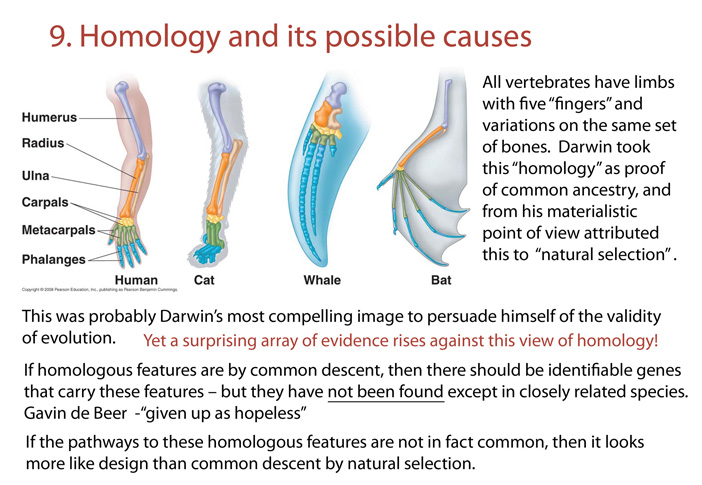
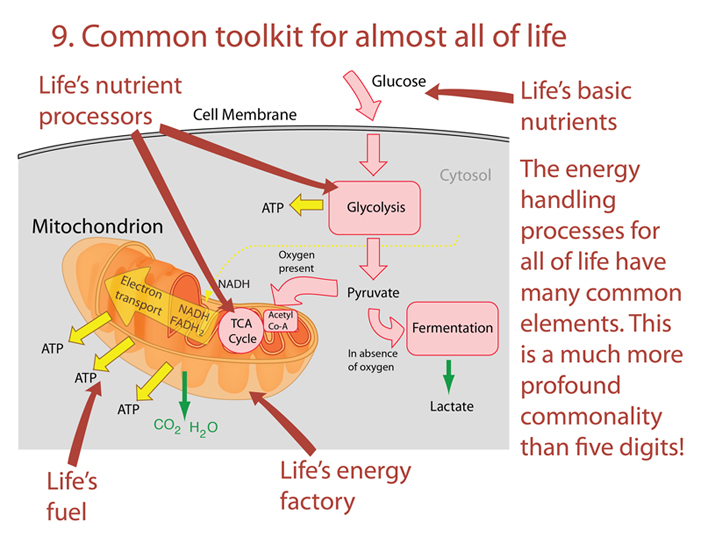
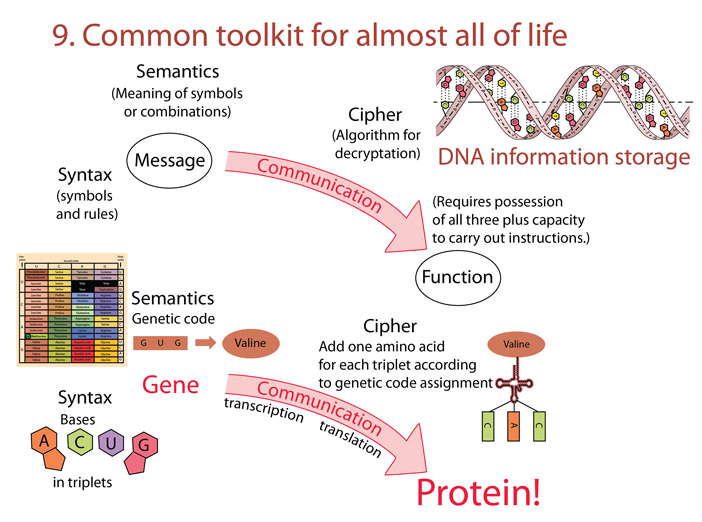
Ch 10 The Conundrum of Convergence
p115 A definition of convergence: "In evolutionary biology, convergent evolution is the process whereby organisms not closely related independently evolve similar traits as a result of having to adapt to similar environments or ecological niches." Coyne, Why Evolution Is True, p101
But this is certainly a loaded definition - the fact involved is that of a similar trait in animals not closely related. The presumptions are bold - that the similarity arose by natural selection influenced by similar environmental pressures, but none of that is established by the observation. And since purposeful modification is disallowed by these presumptions, and using Gould's "replaying the tape" suggests multiple pathways, it is really shaky to argue that the environmental pressures in two different cases would lead to the same features.
p116 Mayr chimes in with "Convergent evolution is a phenomenon that convincingly illustrates the power of natural selection." Mayr's definition "Phenotypic similarity of two taxa that is independently acquired and is not produced by a genotype from a common ancestor." Dawkins makes a similar definition, and all of these are statements of faith that that natural selection can accomplish all this.
p118 Michael Denton's example in Evolution, a Theory in Crisis, p178 certainly rings more true to me.
"Anyone who has been privileged to handle, as I have, both a marsupial and a placental dog skull will attest to the almost eerie degree of convergence between the thylacine[marsupial] and the placental dog. Yet in terms of the soft anatomy of their reproductive systems there is an enormous difference between the two groups."
I would wonder how Gould would feel about this - the whole head similar, an enormously complex structure? How could the playing of different tapes with all foresight forbidden reach the same final rendition? Takes a lot of faith!
p p118 The example of the similarity of the mammalian and katydid ear really stretches things - he suggested 500 million years if they ever shared a common ancestor.
p119-120 Several examples of Gould's assessment of systems including flight and the ichthyosaurs and their superior swimming. Mentions Gould's "rewind the tape of life" model. Then brings in Simon Conway Morris who comments that "rerunning the tape of life is not hypothetical, it's happening all around us." Conway Morris includes the idea of "direction" which would be shunned by the orthodox evolutionists.
p121 Simon Conway Morris in his book "Life's Solution" says that he is struck by the adjectives other biologists use in describing examples of convergence - the frequency of expressions of surprise suggests "almost a feeling of unease in these similarities. Indeed, I strongly suspect that some of these biologists sense the ghost of teleology looking over their shoulders."
p121 discusses the thinness of the claim of "similar habitats" or "similar selection pressures" when one is in Australia and the other is in North America.
p121-122 Pax-6 gene involved in construction of eyes. Eyes have developed independently at least forty times.
p122-123 The ichthyosaur is the example used in a comparison of Buckland's language about its remarkable features as bestowed by divine fiat and Gould's rewording of that as "endowed by natural selection" Bethell uses this to comment: "it reveals how orthodox Darwinians see natural selection. They believe it 'explains' whatever exists in nature, however improbable it might be, just as divine fiat did in pre-Darwin times. Seeing natural selection as all-powerful, they do not take kindly to a dispassionate scrutiny of what it can achieve, or what it has been shown to achieve by experiment."
"Evolutionists, of course, believe that they are appealing to science, in contrast to the religionist's reliance on faith. But the truth is that when they utter their two-word incantation, 'natural selection,' they are not being remotely scientific. Nor are they expected to provide any details."
123 "To today's biologist, in short, natural selection operates as an omnipotent force, just as divine fiat once did"
p124 It is interesting that Lewontin, who declared "we can't let a divine foot in the door" would be so pessimistic about natural selection. About it he wrote "the theory becomes a vacuous exercise in formal logic that has no points of contact with the contingent world. The theory explains nothing because it explains everything."
p124 Bethell's final words in this chapter point to intelligent design. Cites Casey Luskin as suggesting that biological similarity without common ancestry is the result of common design. Human designers reuse parts in different applications. Final sentence "Intelligent design predicts that such re-use will be found frequently in nature, as indeed it is."
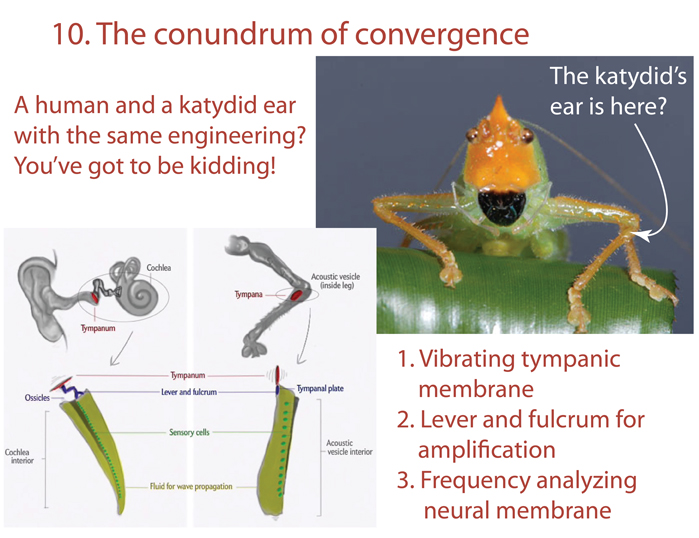
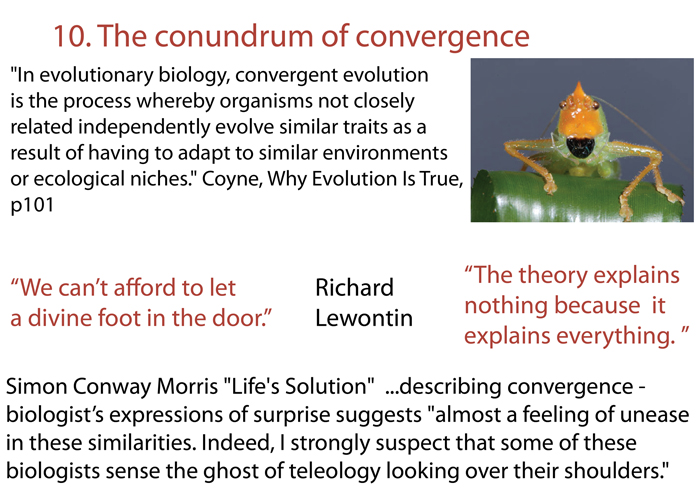
Ch 11 The Fossil Record
p127 Darwin's model of small differences
p127-128 Thomas Huxley's concern about "natura non facit saltum" and Darwin's rejection of large jumps.
p128 In 150 years of fossil collection, 250,000 fossil specimens, so abundant evidence in the geologic column.
p128 "A spokesman for the American Association for the Advancement of Science said in the 1980s that 100 million fossils have been identified and that they 'constitute 100 million facts that prove evolution beyond any doubt whatever.' But fossils, of course, do not make the case for Darwinism. Absent finely graded sequences, the fossil remains of organisms do not imply or disclose ancestor-descendent relationships." Then goes on to quote Ernst Mayr with the line "world is not constant but forever changing became so overwhelming that it could no longer be denied." In this context it is obvious that they are using evolution as change over time and then projecting without evidence that this supports Darwinism.
p130-132 Cites Michael Foote, Stephen Meyer, Dembski, Jonathan Wells, Valentine, Futuyma - abundant fossil evidence, great evolution in terms of "change over time".
p132 Kenneth Miller and Futuyma insist orderly and sequential, but very slow.
p133 Cambrian explosion Whittington, Conway-Morris, Stephen Jay Gould's Wonderful Life.
p134 Gould and Eldridge and punctuated equilibrium
p135 Donn Rosen "Darwin said that evolution happened too slowly for us to see it. Gould and Eldridge said that it happened too quickly for us to see it. Either way, we don't see it."
p136 Chinese fossils
p137 Suddenness of appearance of body plans a problem for Darwinism. Erwin & Valentine, Stephen Meyer's Darwin's Doubt, Eric Davidson, David Raup.
p138 "Fossil remains spread across the history of life confirm 'evolution' if that is simply taken to mean 'change over time.' But a more detailed look shows the fossil record to be more of an obstacle than a confirmation of what is entailed by Darwin's theory."
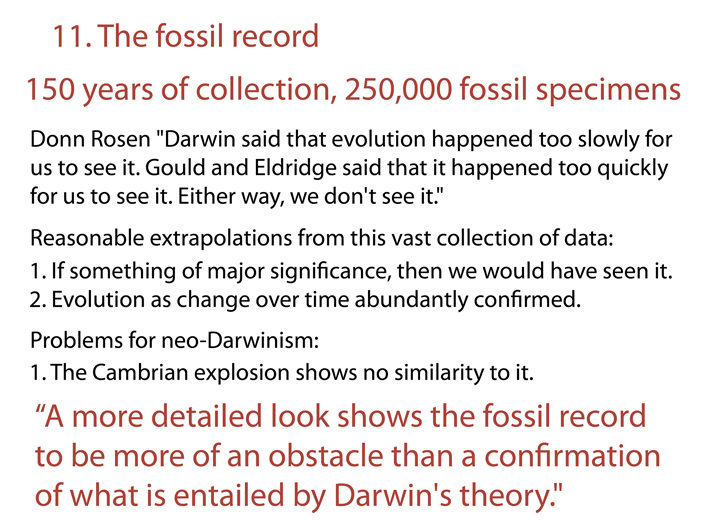
Ch 12 Evolution and Systematics at the American Museum
A general description of the discussions initiated by a talk by Colin Patterson of the Natural History Museum in London at New York's American Museum of Natural History in 1981. Bethell had interviewed him several times. Emphasizes structure and function, and information from fossils, but pessimistic about value of evolutionary theory in biology. Also interviewed Gareth Nelson (expert on anchovies) and Norman Platnick (expert on spiders). He makes the point that life has not been studied thoroughly, and that fossil evidence doesn't fill in greatly. In this general environment he comes to his final story in the chapter:
p149 "Patterson told me that he regarded the theory of evolution as 'often unnecessary' in biology. 'In fact,' he said 'they could do perfectly well without it.' Nevertheless, he said, it was presented in textbooks as though it were 'the unified field theory of biology,' holding the whole subject together - and binding the profession to it. 'Once something has that status,' he said, 'it becomes like a religion.'"
"When I asked him if he 'believed in' evolution himself, he replied: 'Well, isn't it strange that this is what it comes to, that you have to ask me whether I believe it, as if it mattered whether I believe it or not. Yes, I do believe it. But in saying that, it is obvious that it is a faith."
"The complex organisms that he studied certainly exist. And as an atheist he had little choice but to accept that they assembled themselves one small bit at a time. But the fossil record gives little or no support for this faith."
Ch 13 Intelligent Design and Information Theory
p151 General description of the beginning of the ID movement starting with Phillip Johnson, whose book was reviewed by Norman Macbeth in 1990. Surveys participants. Includes Thaxton,Bradley,Olsen and The Mystery of Life book. Others are Behe, Dembski, Klinghoffer, Meyer, Nelson, Sternberg and Wells.
p152 Origin of life as a mystery, but "intelligent design" as forbidden words in biology departments.
p153 Ben Stein in Expelled asked Richard Dawkins how life began. "Dawkins said he had no idea, and neither did anyone else."
p153 Beautiful section titled "Late in the Day" reflecting on ID and Darwinism.
p154 ID as an Inference, discusses the design inference.
p155 "Why should our everyday judgments about design be suspended in the case of living organisms? Because admitting design in biology would immediately overthrow Darwin's theory. Its whole thrust from the beginning was to eliminate the need for a designer - to persuade us that nature could construct organisms without any 'input' from a designer. That is precisely what natural selection was supposed to have achieved. But of course it didn't."
p155 Irreducible Complexity. Comments on Behe's 'Darwin's Black Box' and the bacterial flagellum. Also discusses Behe's mousetrap.
p156 Cites Kenneth Miller and his 'Finding Darwin's God'. Miller argues that the parts to the flagellum can exist outside the flagellum, and Behe's response to that is cited.
p157 Ends with "Intelligent design theory, then, does not identify a designer, any more than we can identify the designer of Stonehenge."
p157 Complex Specified Information. Quotes Dembski "It is unexceptionalable that intelligent causes can do things which unintelligent causes cannot." and discusses Dembski's "explanatory filter". Discusses chance and necessity (law).
p158 Discusses Shannon information and cites Meyer's 'Signature in the Cell' in which it is discussed.
p158 Intelligent Design in the Body.
p158-159 DNA as a code. Like a written language. Cites Doug Axe, Stephen Meyer, Jonathan Wells
p161 James Shapiro "there are presently no detailed Darwinian accounts of the evolution of any biochemical or cellular system, only a variety of wishful speculations." 1996
p161 Entrenched Hostility to ID Amusing summary of that hostility.
p162 A Privileged Planet Discusses Gonzalez's situation of being refused tenure. Pejorative statement of Jefferys, Astronomer UT Austin. Gonzalez took faculty position at Ball State Univ Ind. "He also said that he was denied tenure at Iowa State 'not because of poor academics on my part, but for ideological and political reasons.'"
Ch 14 Darwin and the Philosophy of Materialism
p165 Discusses idea that Darwin delayed publication of Origin so long because he realized that it was so thoroughly materialistic that it would be resisted, citing Gould.
p165-168 general discussion of materialism. Cites Phillip Johnson who discusses Lewontin. Then discusses Dennett and Darwin's Dangerous Idea.
p169 Denial of Free Will
p169 Along the lines of "mind is nothing but matter", he quotes Jerry Coyne and Francis Crick
p169 "Our sense of self is a neuronal illusion." Coyne in Why Evolution Is True
p169 "Your joys and your sorrows, your memories and your ambitions, your sense of personal identiy and free will, are in fact no more than the behavior of a vast assembly of nerve cells and their associated molecules ... You're nothing but a pack of neurons." Francis Crick in The Astonishing Hypothesis, 1995 p3
p169 Cites Michael Egnor, neurosurgeon replies that "certain aspects of the mind - intelligence and will - are inherently immaterial. Therefore they 'cannot be yoked to matter deterministically.'" Interesting continued discussion of that.
p170 "The materialist philosophy puts its advocates at odds with the great majority of mankind, alerting the rest of us to the implausibility of what we are expected to believe. Being told that "evolution is a fact" can be intimidating because many laymen won't know how to respond. But to be told, 'Your will is not free, even though you think it is,' or 'You're an automaton and you don't even know it' is likely to get people's backs up."
p170 Interesting discussion of Dawkins and Dennett who have provoked audiences with such statements. Also Provine who has debated Johnson on tours.
p170 Provine "Let me summarize my views on what modern evolutionary biology tells us loud and clear. There are no gods, no purposes, no goal-directed forces of any kind. There is no life after death. When I die, I am absolutely certain that I am going to be dead. That's the end for me. There is no ultimate foundation for ethics, no ultimate meaning to life, and no free will for humans, either."
p171 "Richard Dawkins made the same claim: 'Religion teaches the dangerous nonsense that death is not the end.' It's interesting to reflect that Dawkins, Provine and some others may in the end cause more trouble for evolutionism than the 'theistic' evolutionists whose goal is to have it both ways.
p171 Mentions Francis Collins and Kenneth Miller as representatives of theistic evolution.
p171 Methodological Naturalism. Term coined by Christian philosopher Paul de Vries of Wheaton in mid 1980s. Contrast MN/PN - somewhat critical of MN and cites Paul Nelson and Stephen Meyer as critical of methodological naturalism. Also Robert Bishop of Biologos critical
173 Why Materialism Is Almost Certainly False. Interesting discussion of Nagel . Nagel expressed some support for ID scholars Stephen Meyer, Michael Behe and David Berlinski.
p174 Nagel "Evolutionary naturalism provides an account of our capacities that undermines their reliability, and in doing so undermines itself."
p174 C S Lewis quotes the usual Haldane criticism and adds another
p175 Nagel "Since the long process of biological evolution is responsible for the existence of conscious organisms, and since a purely physical process cannot explain their existence, it follows that biological evolution must be more than a physical process, and the theory of evolution, if it is to explain the existence of conscious life, must become more than a physical theory."
p175 "Materialism is surely false, to amend Nagel only slightly. But it's a false philosophy with side benefits. It serves to remind us that Darwinism itself is mostly a philosophy dressed up as science. And once the philosophy of materialism is rejected, can Darwinism itself be far behind? Dislodged from its bed of materialism, what is left?"
p175 Darwin's Atheism quotes from his autobiography
Ch 15 DNA: God In the Details
p177 Darwin wrote in Origin "If and organ could not be formed by numerous, successive, slight modifications, my theory would absolutely break down." But in Behe's Darwin's Black Box, he introduces irreducible complexity with the bacterial flagellum as his prime example.
p178 The Cell. Discussion of the cell's complexity compared to Darwin's primitive understanding of it.
p181 Francis Crick (1916-2004) Atheist, but recognized the 'miracle' of protein construction, and finally landed on panspermia.
p182 Lewontin and the chicken and egg dilemma, yet remained a materialist
p182 Fred Hoyle, an atheist who also gravitated to presuming panspermia. Includes his tornado through a junkyard assembling a Boeing 747 comment.
p184 Junk DNA
p185 Human Genome Project 100000 down to 30000 and maybe down to 19000 implies overlapping and multifunction stretches of DNA. ENCODE now up to 80% functional and may go higher.
p186 Irreducible Complexity Behe gained agreement from James Shapiro "There are no detailed Darwinian accounts for the evolution of any fundamental biochemical or cellular system, only a variety of wishful speculations." Bethell comments "It would seem to be safe to assume that the great majority of molecular machines, not just the flagellum, are also irreducibly complex"
p186 Conflict between Molecular and Anatomical Trees. Cites Jonathan Wells and Ann Gauger. Cites Berlinski's The Devil's Delusion.
p188 Darwin of the Gaps. Kenneth Miller charges "God of the Gaps" but then proposes similar type appeals to future molecular research.
p189 A Work in Progress Epigenetics is just moving into the scene. May involve markers that are passed on to progeny. May involve lateral gene transfer.
p190 Behe "the cell's known complexity has increased immeasurably in recent years, and points ever more insistently to an intelligent designer as its cause."
p191 "In summary, the tendency of genomics has been to undermine the old Darwinian verities in a way that organismal biology never could. In particular, we have seen the huge improbability of finding the DNA sequences that generate correct protein folding. All the indications are that as 'scientific progress' continues, with more and more complexities likely to appear, the molecular headaches for Darwin's theory will only increase."
Ch 16 Lenski's Evolving Bacteria
p193 Richard Lenski has been observing E. coli continuously since 1988, through 60000 generations as of April 2014.
p195 "The most important evolutionary changes have involved the loss of old genetic functions rather than the acquisition of new ones."
p196 As of 2005, began to read the gene sequences.
p197 Bethell reports on his discussions with Behe on these matters. Behe contributed his "First Rule of Adaptive Evolution: Break or blunt any functional coded element whose loss would yield a net fitness gain." Also from Behe "Blowing up a bridge is not the opposite of making one" Bethell: " knowing how to demolish something tells you little or nothing about what was needed to build it in the first place." One of the things that was dumped was the flagella - since their vials were shaken, they didn't need to swim around to feed.
p198 Biggest change was the development of the ability to use citrate as a food. A piece of DNA close to the citrate gene got duplicated by accident. Allowed the gene to be active in the presence of oxygen.
p199 No new functional elements. All still E Coli.
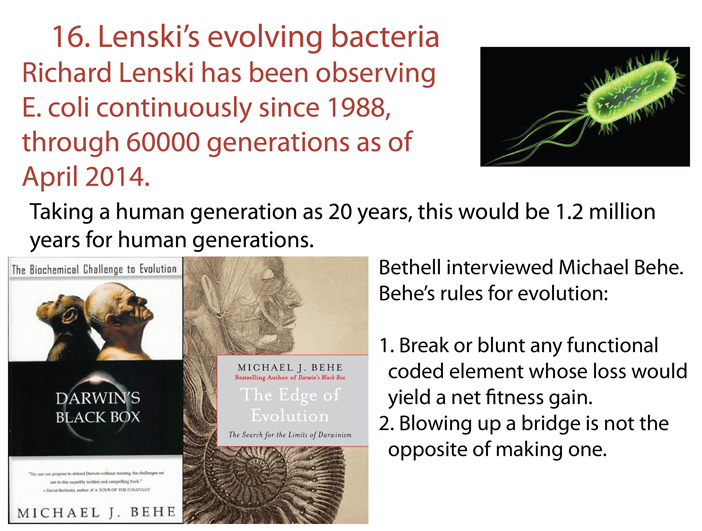
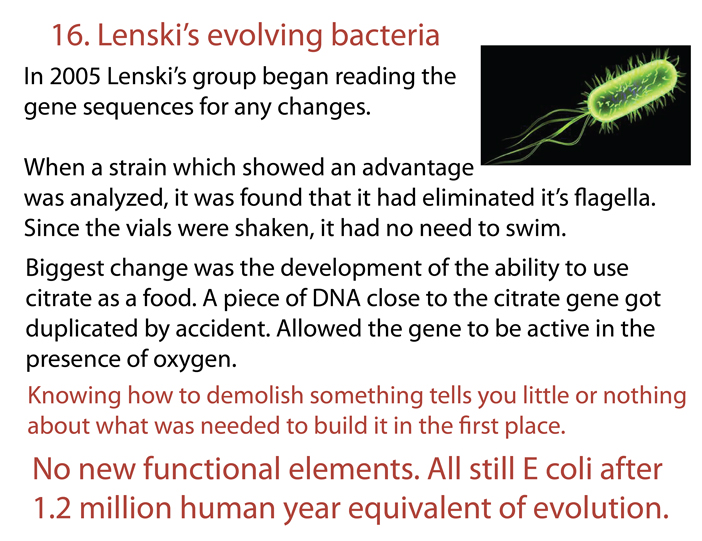
Ch 17 The Sociobiology Wars
p201 Edward O. Wilson is the main character in this chapter. He wrote a book Sociobiology: The New Synthesis. His expertise is with ants, and all but the final chapter dealt with insects. But his last chapter on human behavior "ignited the most tumultuous academic controversy of the 1970s" by his own admission.
p202 Wilson grew up Baptist in Alabama but lost his faith.
p202 Suggested that genes determined behavior, replacing the idea of "instincts" controlling behavior. Opposed was Lewontin. Ally was Gould. The left reacted very negatively, comparing to eugenics policies of Nazi Germany. Lots of examples given of discussions of genes and behavior.
p212 After lots of controversy and running afoul of Dawkins, Coyne and many other biologists, sociobiology and evolutionary psychology sort of disappeared. Wilson's later works were seen as contributing to the environmentalist cause and he came out smelling like a rose.
Ch 18 Human Exceptionalism and Its Enemies
p213 Darwin thought of humans as unexceptional
p214 Thomas Huxley joined in this mindset.
p215 Gould jumps in, accusing humans of arrogance. Bethell's comment: "The accusation of arrogance is self-defeating on its face. Only humans are capable of arrogance or seeing themselves as superior to other animals. Animals cannot rise to that level of abstraction."
p215 David P. Barash, biologist at U.Washington, is a new voice to me, but the refrain is familiar. "Before Darwin, one could believe that human beings were distinct from other life-forms, chips off the old divine block. No more." includes "underlying linkage -- literally and phylogenetically.." "no literally supernatural trait has ever been found in homo sapiens.." Sounds to me about as astute as the Russian cosmonauts in orbit presuming that they had x'd out religion because they didn't find God there. Bethell's comment "What would a good materialist like Barash expect to find? Seraphic wings? Looking for supernatural traits at the natural level is as illogical as hunting for the mind in brain cells."
p216 Another new voice to me is James Rachels (1941-2003), Created from Animals (1990) "(after Darwin) we can no longer think of ourselves as occupying a special place in creation - instead, we must realize that we are products of the same evolutionary forces, working blindly and without purpose, that shaped the rest of the animal kingdom." An animal rights activist and supporter of active euthanasia. Wow!Treating Darwin like a god and presuming blindness and purposelessness! Incredible statement of faith. Bethell follows this with a quote on fine tuning from New Scientist as a sanity check.
p216 As a contrasting reference to Rachels, he points to Gonzalez and Richards and The Privileged Planet, which can also be considered a statement of faith, but with a lot more common sense and evidence as I see it.
p217-220 Chimp talk. Fairly detailed story of teaching chimps to talk, with sometimes extravagant claims of success. Bottom line: no sentence structure, remembering words to get treats, never surpassing a two-year old human, ..etc.
p220 From Chimps to the Stars Discusses Copernican Principle, Mediocrity Principle, but in the failure of finding intelligent life prompts him to include the Fermi principle for which he tells the story. Reflecting on the vastness of space and the likelihood of many planets, Fermi asks "So where is everybody?" Then brings in the Drake equation, with the implication of the kind of scorn with which I also view it. Then the "warm little pond" of Darwin and the failure to come close to creating life.
p220 From Exceptionalism to Misanthropy "Gould jeered at our 'need to see ourselves as separate and superior.'" I didn't realize that Gould had gone there. Quotes The Panda's Thumb "we who revel in nature's diversity and feel instructed by every animal tend to brand Homo sapiens as the greatest catastrophe since the Cretaceous extinction." That sounds pretty sick to me.
p222 Steven Weinberg in The First Three Minutes says humans are "just a more or less farcical outcome of a chain of accidents reaching back to the first three minutes.." That doesn't surprise me, having read other philosophical stuff from Weinberg. But the physics in The First Three Minutes is very good and I have made a lot of use of it.
p223 Not surprisingly, Sagan and Dawkins from their perspectives basically say, if it happened here, surely it must be common in the universe.
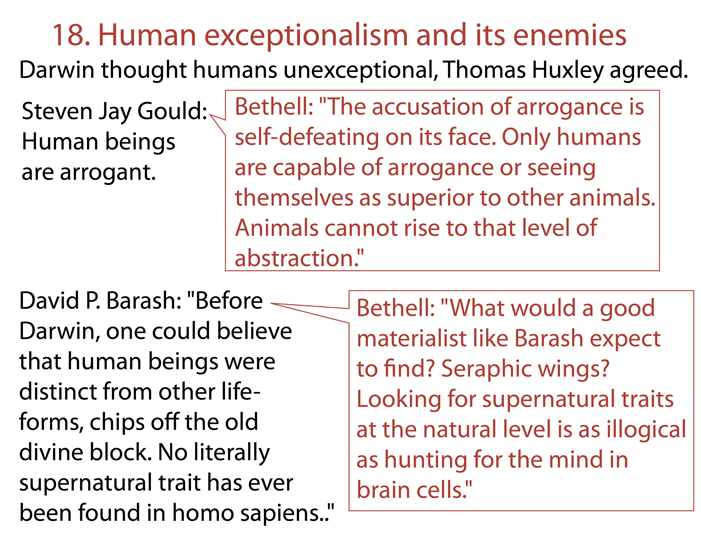
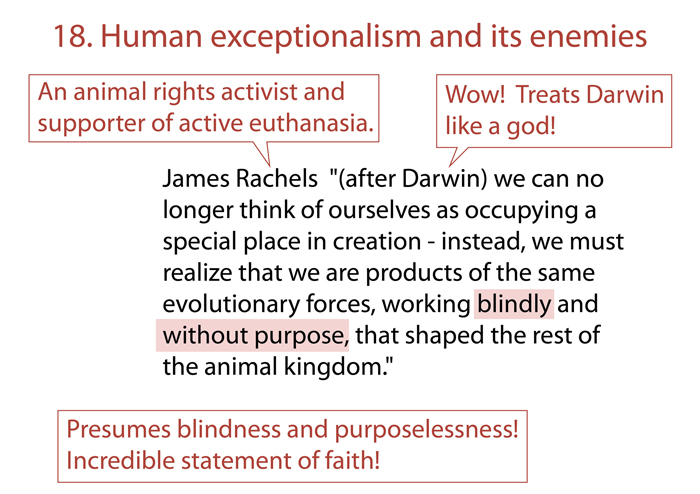
Ch 19 The Search for Artificial Intelligence
p227 Contrasts strong and applied AI and discusses the remarkable successes of applied in situations like driverless vehicles. But then has amusing discussion of the intelligence of a fox, a fly ..
p228 Quote of Krauthammer who believes we will achieve machine consciousness.
p229 The Singularity and utopian futurist Ray Kurzweil, who is with Google. Author of The Age of Spiritual Machines(1999) and The Singularity is Near (2005), he defines the "singularity" as the time when machine intelligence exceeds that of humans. Kurzweil consumes between 180 and 250 pills a day in a quest to live until the singularity, which he most recently predicted would be in 2045. Also wrote How to Create a Mind: The Secret of Human Thought Revealed (2012)
p230 Common Sense, Uncommon Difficulty. "Since 1984, Cycorp CEO Douglas Lenat and assistants have been encoding common-sense knowledge - the literally millions of things that small children know but that are normally too obvious to spell out." By 2002, 600 person years of work, three million rules of thumb plus 300,000 terms or concepts.
p230 pessimistic statement by Marvin Minsky.
p233 Minsky wrote The Society of Mind. Was very pessimistic about AI
p234 David Gelernter, computer science professor at Yale, is introduced as another significant voice related to computer intelligence. Wrote favorably of Nagel's work. Good quote about Nagel.
p235 Gelernter criticizes Kurzweil,discusses Daniel Dennett - worth giving some further attention.
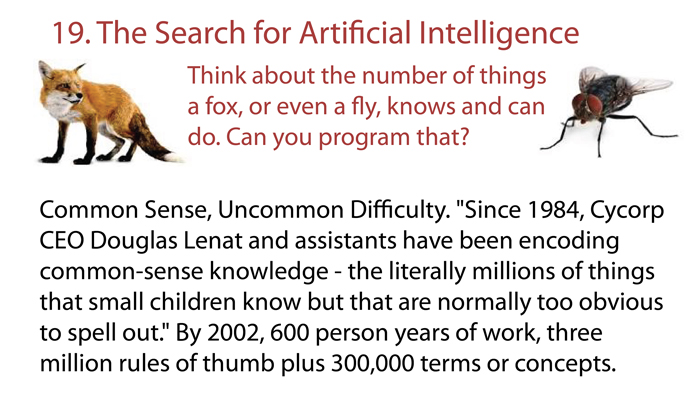
Ch 20 Biogeography and Darwin's Theology
p237 States that Darwin says more things of theological nature in his biogeography chapters than in any other.
p237 Considerable discussion of Louis Agassiz ( -1873), professor of Zoology and Geology at Harvard was one of Darwin's contemporary critics. Agassiz museum, funded by his successful son, had offices of Gould, Lewontin and Wilson! But he was a theist and held "ideas about as far from Darwin's as can be imagined." according to Bethell.
p241 Barry G. Gale Evolution Without Evidence seems to have been articulate in his criticism of Darwinism.
p241 Suggests that Darwin's widow censored some of his more outspoken criticisms of religion, but that his correspondence reveals a good bit of his thought.
p242 Harvard botanist Asa Gray was an admirer of Darwin, but was a theist and tried to persuade Darwin in that direction.
p242-246 contain quotes from Darwin's correspondence, which made it clear that he rejected Christianity with prejudice, took evil as an argument against God, took refuge in infinite regress as does Dawkins, and took personal offense against the idea that sin would be punished by God.
p242 Darwin blew off Gray's question about what would convince him of design, but elsewhere declared that his theories were "not at all necessarily atheistic" but felt "most deeply that the whole subject is too profound for the human intellect. A dog might as well speculate on the mind of Newton."
p242 Letter in 1873 to Utrecht: "I may say that the impossibility of conceiving that this grand and wondrous universe, with our conscious selves, arose through chance, seems to me to be the chief argument for the existence of God; but whether this is an argument of real value, I have never been able to decide. I am aware that if we admit a first cause, the mind still craves to know whence it came from and how it arose."
p243 Longer quotes of Darwin.
p244 In Autobiography he specifically responds to Paley
p245 Bottom 245 and 246 contain the saddest quotes, revealing not only a complete loss of faith but personal animosity toward Christianity. Some think the death of his oldest daughter at about age 10 had a profound negative effect on his view of life.
Ch 21 The Rise and Fall of Progress
p246 Discussion and quote of Spencer's contribution to the universal progress mentality.
p248 Explores idea that the society's confidence in progress made them less critical and more accepting of Darwin's model.
p249 Discussion of the Descent of Man
p251 Explores association with Communism
p252 Rejection of "Progress". Quotes C S Lewis "The World's Last Night". Other authors Beatrice Potter, Solzhenitsyn. Of course two world wars didn't contribute to optimism.
p254 Environmentalism enters and takes a very negative view of Homo sapiens.
p257 Materialism as the one wide-spread philosophy that lends support to Darwinism.
p257 "At the moment, I believe, the science of Darwinism amounts to little more than the 'wedding' of materialism and Progress. We have seen that if materialism is true, then Darwinism - or something very much like it - must also be true. But materialism is highly implausible and has been widely challenged. At the same time it takes only one partner to break up a marriage, and as we now know, Progress has wandered off the straight and narrow. As a result, the break-up of Darwinism seems likely in the years ahead."
| Reading Reference |
| Faithpath | R Nave |